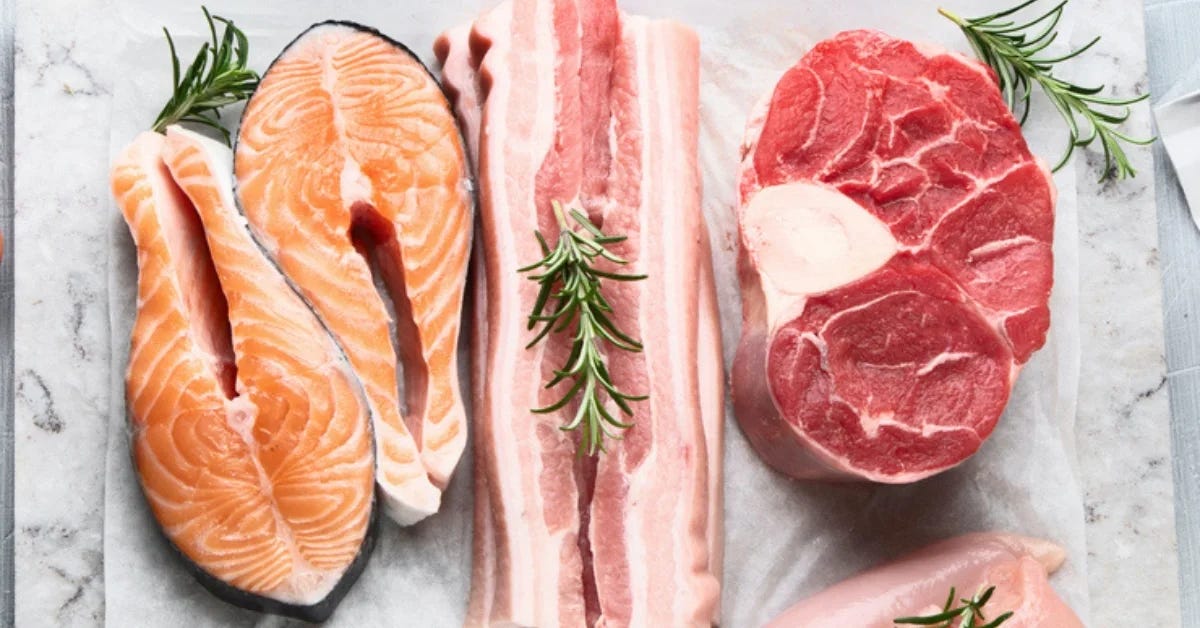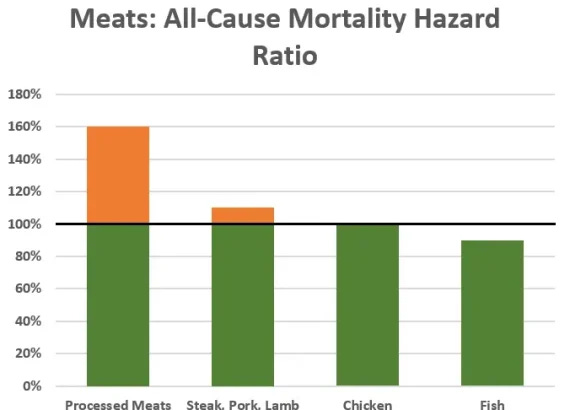Exploring the Health Implications of Animal-Based Diets: A Comprehensive Analysis
Understanding the Impact of Different Meat Choices on Longevity and Health Outcomes
Meat is a weighty matter. Whether the meal has meat decides whether or not it even counts as a meal for many people. For me, having eaten a vegan diet for a year, then expanding to more of a pescatarian diet (fish ok!), I'm flexible about what kind of protein the meal has, but I must admit my dinner always has some animal protein in it. Many of my friends are confirmed carnivores, so many of our get-togethers feature barbecue.
For longevity, where you get your primary source of protein is a key differentiator. Let's go through it from the ugly, the bad, the mediocre, and the good.
The ugly is processed meats, like hot dogs, sausages, ham, bacon, corned beef, smoked meats, jerky, canned meats, etc. It's a long list and includes deli meats that aren't even red meat, like turkey slices, but doesn't include minced meat like hamburgers. Processed meats contain chemicals to extend the life of the meat on the shelf but will shorten your life. These are chemicals like nitrites, salt, and polycyclic aromatic hydrocarbons. Some of them cause cancer, and others cause high blood pressure. Eating 200 grams of processed meat a day increases all-cause mortality by a whopping 60% Food groups and risk of all-cause mortality: a systematic review and meta-analysis of prospective studies1. In general, only eat processed meats on special occasions that are more special than "it's the weekend." 😉
The bad is regular red meat. This includes beef, minced meat like hamburgers, lamb, and pork ("other white meat" marketing notwithstanding). While it doesn't have the shelf-extending, life-shortening preservatives in processed meat, red meats still have chemicals that shorten life. A common suspect is saturated fat, but thus far, in my research, I haven't yet seen a clear link between saturated fats and mortality. While it seems to make sense, since medicines that reduce cholesterol reduce heart attacks, from my blog post on Breaking Down the Component model, there are counterexamples like nuts where increased saturated fats do not increase all-cause mortality, so it may be a marker for other chemicals in red meat that shorten life. Also, in addition to the increased cardiovascular disease, red meat appears to increase cancer, colorectal and other kinds. About 200 grams of red meat a day increases all-cause mortality by about 10% 1.
Falling right in the middle of not good and not bad is poultry, which is chicken and turkey (No offense, pheasant hunters). While the deli meats of these are considered ugly processed meats, the unprocessed poultry seems to neither materially increase nor decrease lifespan. However, this doesn't extend to fried chicken, which appears to shorten life about as much as red meat2.
Fish are in the good category, as at last we find an animal protein that increases lifespan, although, again, this is excluding fried fish. For those getting enough protein from other health sources, like beans, and not fond of fish, it looks like most of the benefits of eating fish can be obtained just from taking a daily fish oil supplement, which gives a similar reduction in all-cause mortality3. Eating 200 grams of fish per day reduces all-cause mortality by 10% or about as much as red meat shortens it. I guess the surf-and-turf plates in restaurants average out to a wash. In general, I favor fish over other meats, although my friends have caught on to this and offer to share with me the "fish sirloin," "fish cutlets," or "fish drumsticks" they're eating. 😂
FAQs
1. What dietary changes should be made regarding meat consumption?
Regarding meat consumption follow a pescatarian diet, where fish can be included as an acceptable source of protein, providing more dietary flexibility.
2. What is a pescatarian diet?
A pescatarian diet is a dietary approach that includes fish but typically omits meat from mammals or birds. It often includes vegetables, grains, and dairy. It is considered the most healthy diet for humans.
3. How does poultry compare in terms of health impact?
Unprocessed poultry (chicken and turkey) falls in the middle, neither significantly increasing nor decreasing lifespan. However, fried chicken is associated with a similar life-shortening effect as red meat4 , indicating the significance of preparation methods.
4. Is an animal-based diet healthy?
There are many benefits of an animal-based diet if balanced properly. Including more fish—rich in omega-3 fatty acids and lean protein—and less red and processed meats, which are linked to health issues, can contribute to overall wellness. As always, variety, moderation, and balanced nutrition are key.
5. What are the different categories of meat based on their impact on longevity?
The meat categories are classified into "ugly" (processed meats with harmful chemicals), "bad" (regular red meat with possible life-shortening factors), "mediocre" (unprocessed poultry), and "good" (fish that increases lifespan), aiding in informed dietary choices.
6. Why are processed meats considered harmful to health?
Processed meats contain chemicals like nitrites, salt, and polycyclic aromatic hydrocarbons that are linked to cancer5 and high blood pressure.6 Consuming 200 grams a day increases all-cause mortality by 60%, emphasizing the importance of moderation.
7. Can similar benefits of fish consumption be achieved without eating fish directly?
Yes, taking a daily fish oil supplement can offer similar reductions in all-cause mortality for those who prefer other protein sources, like beans, providing flexibility in dietary choices.
8. What are the suggested guidelines for consuming processed meats?
Processed meats should be consumed with caution and reserved for special occasions rather than regular consumption, promoting a balanced and healthful approach to eating.
9. Are there any animal proteins that positively impact lifespan?
Yes, fish is considered a good category of animal protein, as it increases lifespan. Eating 200 grams of fish per day reduces the risk of premature death by 10%, supporting its inclusion in a health-conscious diet.
Ready to Hack Your Lifestyle and Live Longer? Subscribe Now and start your journey to a longer, healthier life!
Discover your true biological age with our FREE Longevity Calculator and unlock personalized biohacks to optimize your health and well-being.



